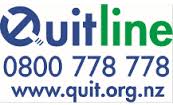575 Mt Eden Road
Phone: 623 4599
Becoming Smoke free
Make a decision to give up today.
Quitting smoking is a commitment to a healthier life and being able to enjoy outdoor activities with family and friends. It is also a commitment to the future, to your children and grandchildren.
|
It’s one of the best decisions you can make for your own health, you could save thousands of dollars every year, and it’s a great thing to do for the well-being of your family and your friends. |
Talk to your nurse or doctor. Your doctor may prescribe a medication that will increase your chance of quitting. There are several medications available and we can discuss the best option for you. We can also send a referral to Quitline for you.
Call Quitline 0800 778 778 or go to www.quit.org.nz
Quitline provides free stop smoking help for all New Zealanders. People who want to quit will get support via phone, online and text.
With Quitline you're five times more likely to quit smoking than quitting alone.
Steps to quit smoking
1. Set a quit date
Try to choose a time when you don’t have extra stress or pressure to deal with.
2. Know your reasons
Every smoker has their own reasons to quit. Being really clear about these can help you stay motivated. You might find it useful to write a list and pin it up somewhere you can see or keep it with you. It can help you in tough times.
-
Cost: A pack a day costs about $6,000 per year, and that cost is only going to rise. What would you rather spend the money on?
- Is it for family or whanau or friends? Children of smokers are seven times more likely to become smokers themselves.
- Is it for health? Tobacco is the only product that kills people when used as the manufacturer intends. The good news is that as soon as you stop smoking, your body begins to repair itself.
3. Know your triggers
- Habits: Do you smoke after a meal, while drinking alcohol or coffee/tea? Sometimes people smoke when they feel sad or stressed. Have a list of other things you can do instead of smoking at these times.
- Addiction to nicotine: Patches gum and lozenges can help with physical cravings.
- Feelings: Emotions are big triggers too. You might smoke for comfort when sad or for relief when stressed. You can talk to your nurse and doctor to get help with emotional problems.
4. Use patches, gum or lozenges
They double your chances of quitting for good. If you get a prescription from your doctor or have signed up with Quitline they cost $5 for an 8 week supply.
5. Stay Smokefree
You may sometimes get strong cravings to smoke, even years after quitting. This is normal and doesn't mean you're failing.

